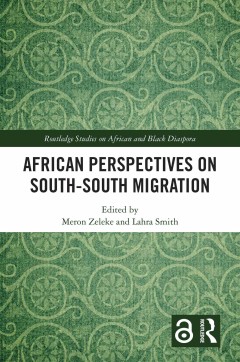Filter by

African perspectives on South-South migration
This book investigates the diverse and dynamic forms of migration within Africa. Centring themes of agency, resource flows, and transnational networks, the book examines the enduring appeal of the Global South as a place of origin, transit, and destination. Popular media, government pronouncements, and much of the global research discourse continue to be oriented towards migration from the G…
- Edition
- -
- ISBN/ISSN
- 9781003368267
- Collation
- -
- Series Title
- -
- Call Number
- -

African identities and international politics
Using the lenses of realism, liberalism, the English School and constructivism, this book explains how the divisions and differences in African identities affect African international politics. This book explores the African condition in the twenty-first century. It analyses how geographical, racial, ethnic, linguistic, religious and power differences shape continental and intercontinental rel…
- Edition
- -
- ISBN/ISSN
- 9781003176732
- Collation
- 176
- Series Title
- -
- Call Number
- -

African initiated Christianity and the decolonization of developmen : sustain…
This book investigates the substantial and growing contribution which African Independent and Pentecostal Churches are making to sustainable development in all its manifold forms. Moreover, this volume seeks to elucidate how these churches reshape the very notion of sustainable development and contribute to the decolonisation of development. Fostering both overarching and comparative perspec…
- Edition
- -
- ISBN/ISSN
- 9780367823825
- Collation
- 354 p
- Series Title
- -
- Call Number
- 260 AFR

Vaccine Hesitancy in the Nordic Countries Trust and Distrust During the COVI…
Bringing together studies from across the Nordic region, this book examines the challenges brought by the COVID-19 pandemic, with a particular focus on vaccine hesitancy. Shedding light on the political tensions that emerged as a result of the pandemic and the debates that ensued both within and between the Nordic nations, it investigates the vociferous discussions surrounding the COVID-19 vacc…
- Edition
- -
- ISBN/ISSN
- 9781003305859
- Collation
- -
- Series Title
- -
- Call Number
- -

Rethinking White Societies in Southern Africa : 1930s–1990s
ABSTRACT This book showcases new research by emerging and established scholars on white workers and the white poor in Southern Africa. Rethinking White Societies in Southern Africa challenges the geographical and chronological limitations of existing scholarship by presenting case studies from Angola, Mozambique, South Africa, Zambia and Zimbabwe that track the fortunes of nonhegemonic whit…
- Edition
- -
- ISBN/ISSN
- 9781003002307
- Collation
- -
- Series Title
- -
- Call Number
- 370

Russian Nationalism : Imaginaries, Doctrines, and Political Battlefields
This book, by one of the foremost authorities on the subject, explores the complex nature of Russian nationalism. It examines nationalism as a multilayered and multifaceted repertoire displayed by a myriad of actors. It considers nationalism as various concepts and ideas emphasizing Russia’s distinctive national character, based on the country’s geography, history, Orthodoxy, and Soviet tec…
- Edition
- -
- ISBN/ISSN
- 9780429426773
- Collation
- -
- Series Title
- -
- Call Number
- 370

Advancing Sexual and Reproductive Health and Rights in Africa : Constraints a…
ABSTRACT This book explores recent developments, constraints and opportunities relating to the advancement of sexual and reproductive health and rights in Africa. Despite many positive developments in relation to sexual and reproductive health in recent years, many Africans still encounter challenges, for instance in poor maternity services, living with HIV, and discrimination on the basis …
- Edition
- -
- ISBN/ISSN
- 9781003175049
- Collation
- -
- Series Title
- -
- Call Number
- -

Russia’s Cultural Statecraft
ABSTRACT This book focusses on Russia’s cultural statecraft in dealing with a number of institutional cultural domains such as education, museums and monuments, high arts and sport. It analyses to what extent Russia’s cultural activities abroad have been used for foreign policy purposes, and perceived as having a political dimension. Building on the concept of cultural statecraft, the a…
- Edition
- -
- ISBN/ISSN
- 9781003141785
- Collation
- -
- Series Title
- -
- Call Number
- -
Consumer-citizens of China: the role of foreign brands in the imagined future…
A PDF version of this book is available for free in open access via www.tandfebooks.com as well as the OAPEN Library platform, www.oapen.org. It has been made available under a Creative Commons Attribution-Non Commercial-No Derivatives 3.0 license and is part of the OAPEN-UK research project. This book presents a comprehensive examination of Chinese consumer behaviour and challenges the previo…
- Edition
- 1st Edition
- ISBN/ISSN
- 9780203840115
- Collation
- -
- Series Title
- -
- Call Number
- -
The politics of coalition in Korea: between institutions and culture
This book examines how inter- and intra-party coalition-building affects governability in South Korea. Focusing on the Kim Dae-jung administration (1998-2003) as a case study in the failure of a government to turn electoral success into stable governability, or ability to implement reform policies, the book’s research draws on two bodies of literature which, though focusing on the same depend…
- Edition
- 1st Edition
- ISBN/ISSN
- 9780203821138
- Collation
- -
- Series Title
- -
- Call Number
- -
 Computer Science, Information & General Works
Computer Science, Information & General Works  Philosophy & Psychology
Philosophy & Psychology  Religion
Religion  Social Sciences
Social Sciences  Language
Language  Pure Science
Pure Science  Applied Sciences
Applied Sciences  Art & Recreation
Art & Recreation  Literature
Literature  History & Geography
History & Geography